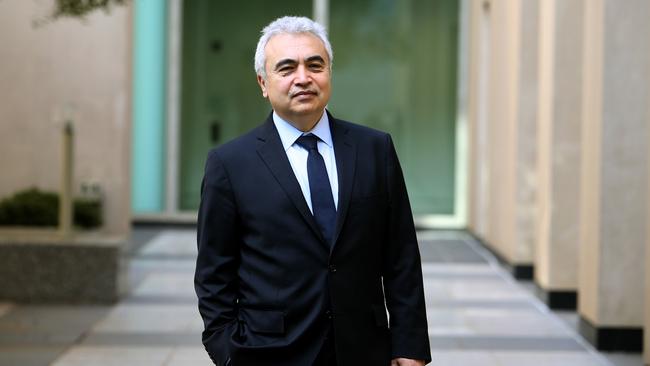Energy crisis ‘no excuse for more coal and gas’, International Energy Agency warns
Australia must resist using an international energy crisis sparked by the Ukraine war as an excuse for developing new coal mines and gas fields, the IEA has warned.

Australia must resist using an international energy crisis sparked by the Ukraine war as an excuse for developing new coal mines and gas fields, the International Energy Agency has warned, while admitting soaring commodity prices have heightened the risk of a global recession.
The IEA issued its edict for no new fossil fuel developments to be opened up a year ago, saying that if the world was going to reach net zero emissions by 2050 wealthy nations like Australia must adopt more ambitious targets to meet climate change goals.
Despite the global energy crunch turbocharging demand for coal and gas, two of Australia’s biggest commodity exports, the IEA said the difficulties should not lead to the nation opening the floodgates on new projects.
Instead, Australia should use the crisis to push for a faster rollout of renewables to meet soaring demand.
“I would be very careful not to use the Russian invasion of Ukraine as an excuse in order to initiate large-scale investments in fossil fuels, which would lock in our energy system, and make our chances to reach our climate goals almost impossible,” IEA executive director Fatih Birol told The Australian ahead of the Sydney Energy Forum.
Fossil-fuel facilities that did proceed also faced heightened commercial risk, given that the world must substantially curb its use of the commodities over the medium term.
“Producers that do proceed face not only climate risk but business risk,” Dr Birol said.
“Because if today you decide to develop a new oil field, the first oil will come in seven to 10 years, which will not be a response to the current crisis.
“Whether the world will need additional oil production then is a question that poses a risk to business.”
Record coal, gas and electricity prices have piled pressure on inflation in economies around the world and raised the potential for a global recession, according to the IEA chief.
“I am seriously concerned that the current oil, gas, coal and electricity prices can trigger a recession in Europe, first of all, and also globally,” Dr Birol said.
“And for Europe, I wouldn’t rule out the complete cut-off of Russian gas this winter for Europe, which was a serious impact for the economy, for the social life in European countries, especially those who are heavily relying on Russian gas such as Germany and Italy. Economic recession is a real risk for Europe and for the rest of the world, mainly triggered by high energy commodity prices.”
Still, producers must also respond to the current clamour for supplies. “I think it is important for the oil producers to see this risk and take some responsible steps to comfort markets,” Dr Birol said.
The global energy squeeze, exacerbated by Vladimir Putin’s invasion of Ukraine, will lift Australia’s mining and energy exports to record levels for the next three years, with resources revenue set to eclipse $1.1 trillion by mid-2024.
Big energy producers from Woodside Energy through to Santos and Adani are embarking on a string of multibillion-dollar projects, partly to make up for years of underinvestment, as countries increasingly prioritise security of supply over immediate climate change needs.
Despite an international backlash by financiers against funding coal, investment in the fossil fuel rose by 10 per cent last year to $US105bn due to growth in Asia.
A similar jump is tipped for both 2022 and 2023, but Dr Birol said Australian producers should be wary.
“If we see new investments coming we should be ready to say goodbye to our climate goals,” he said. “And investors must make sure they have these calculations right because in a few years’ time the world may not need additional coal production capacity. If I was a coal investor today in Australia, I would think twice.”
The IEA boss also backed new European Parliament rules passed last week that allowed green investment labels for gas and nuclear power, despite concern the move could be seen as greenwashing the energy sources.
The new rules mean both gas and nuclear can be marketed as green in the EU from 2023, amid a broader debate over how to hit climate goals while maintaining sanctions against Russia.
“I believe nuclear power can play an important role for providing security for electricity markets, as well as reducing the emissions for natural gas,” Dr Birol said.
“There are very strict environmental conditions for natural gas investments in the European proposal, and if those are observed under certain specific conditions, I think this can be helpful for an added security.”
While both major political parties in Australia have a goal of net zero emissions by 2050, Labor plans to lower Australia’s emissions by 43 per cent of 2005 levels by 2030 while the Coalition has pledged to cut emissions by 26 to 28 per cent by the end of this decade.






To join the conversation, please log in. Don't have an account? Register
Join the conversation, you are commenting as Logout